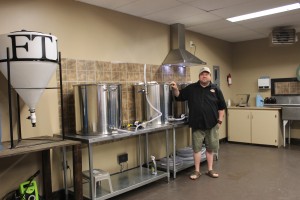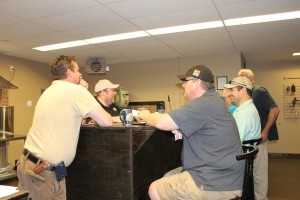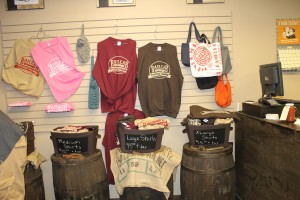NB Liquor Strikes a Low Blow at Craft Breweries
Stephanie Kelley
The microbrew beer industry has exploded in popularity over the past five years. Craft beer sales have gone from 3 percent of total beer sales in North America to 12 percent, a growth of 400 percent over those five years.

The craft beer industry got off to a slow start in New Brunswick but has now been discovered. Just as people have been becoming more focussed on eating local and organic, so have they realized the delights of drinking beer with flavour that is lovingly made in small batches by dedicated and enthusiastic master brewers.
Mitch Biggar is on the verge of opening Railcar Brewing Company in Florenceville-Bristol, with four other microbrew operations around the province planning to open within the coming year.
Two weeks ago, these craft brewers received an email from New Brunswick Liquor Corporation informing them that there are new rules in effect: Effective immediately, all new craft breweries will no longer be permitted to sell their own product in their own brewery until they have first sold at least 100 hectolitres of their product through ANBL Agency Stores.
That is 10,000 litres of beer, or 1,200 cases of bottles.
This new regulation would destroy the new micro-breweries before they even fill their first bottles.
The NBLC board of directors came up with this regulation behind closed doors without consulting anyone in the industry that this ruling would affect.
In Mitch’s case, his entire business plan was dependent on selling his beer in one litre growlers in his brewery. He had not planned on getting into bottling for another five years.
Craft brewers have always been allowed to sell their own product in this province, although NB already has the most restrictive regulations of all Canadian provinces.
In the rest of the Maritime provinces, craft brewers are allowed to sell their beers at farmer’s markets, which gives the brewers a lot more opportunity for sales and public exposure.
The requirement to sell 10,000 litres through NBLC would prove to be a business killer for small craft breweries for a number of reasons.

For Railcar Brewing Company, 10,000 litres would be the total production in a year if Mitch ran constantly and never spoiled a batch or spilled a drop.
The rule would pit small brewers against each other. The craft brewing industry is like a fraternity, with everyone cooperating to help each other out and to grow the industry. There’s competition, sure, but it’s competition to brew better beers, not corner market shares. If craft brewers are all required to sell through ANBL they will be desperately competing for shelf space.
Craft beer only has a shelf life of 30 days. Any products not sold by ANBL would have to be destroyed after that period. When brewers ell through their own stores, they brew what they need when they need it.
Craft brewery products are regional. Local residents become very loyal to “their own” brewery. The regionality factor encourages tourism as well. People love to visit local craft brewing operations and taste the products on site, as they meet the brewmaster and purchase spin-off products like souvenir t-shirts, mugs, coaster and so on.
The new rule also stipulates that a brewtique, where brewers sell their t-shirts and souvenir items, must be located on the same premises as the brewery. They can’t sell their products elsewhere.
In short, NBLC couldn’t have come up with a more devastating and industry killing set of rules if they’d tried.
Craft brewers around the province were stunned by the new regulation. This ruling would affect more than just the brewers themselves… the craft brewing industry requires hops, grains, equipment and bottles. As craft brewing has gained in popularity, it has spurred the growth of other industries as well.
Everyone involved in the industry reacted quickly and with outrage.
Nick and Kathryn Southan operate Southan Farms in Wicklow, where they have been growing hops for three years. Kathryn immediately organized an online petition to protest the new regulation.
This petition quickly gathered over 500 signatures, along with some fascinating and insightful comments on the New Brunswick Liquor Corporation, the provincial government and how NB stifles small business every chance it gets.
Mitch requested a meeting with Brian Harriman, the President and CEO of NBLC to discuss the issue.
In the meantime, CBC contacted both Mitch and Brian Harriman and conducted several interviews, which were quite interesting.
Harriman stated during the interviews that “the intention of the threshold of 100 hectolitres before being allowed to sell growlers is not to stifle the entry into beer or to force product through our system.”
(no, seriously???)
“It is to ensure that people entering a category are able to financially support and produce quality products, which have consumer demand and which are safe for the public.”
The whole idea of building a small business means you grow at your own pace. Imposing economic sanctions like this isn’t going to ensure safe products, it will ensure NO products whatsoever.
This brings me back to the regulations governing microbreweries in other provinces. For instance, the craft beer industry is embraced and supported wholeheartedly in Nova Scotia. Craft brewers are able to sell their products at farm markets. Big Spruce is a microbrewery that opened in NS just a year ago.
As a result of Nova Scotia’s way more supportive and liberal liquor act, Big Spruce has been able to expand 3 times in a year. Indeed, it needed to expand to keep up with sales! Which means more revenue and more jobs… jobs which NB claims to want to create but they just can’t come up with any better ideas than clear cutting and hydro-fracking.
But I digress.
The previous president of ANBL said “We’ve been making changes as we go from being a liquor control board to being a liquor retailer.”
But Harriman, the current president, brought up the public safety bogieman during his interview, “We’ve had a case in the past 12 months where someone was making beer in a wash tub with a garden hose.”
Having planted that disturbing image in the listeners’ minds, he hastened to add “99.9 percent of craft brewers are responsible. But if anything happens, it will fall in our laps.”
“In fact, we’re helping microbreweries by offering them multiple storefronts!”
How is it legal for a for-profit corporation, ANBL, to set the laws in its own industry, especially laws that are obviously designed to serve some sort of agenda?
Free enterprise in New Brunswick is not only discouraged, but rules are made to stop it dead in its tracks.
Harriman also claimed that “We had not met or heard of Mitch Biggar until last Monday.” (When Mitch contacted them about the new rules)
This is a very interesting claim, because Mitch has been working to get Railcar Brewing Company up and running for nearly two years. In order to do this, he has had to apply for 6 different licenses, submit to multiple inspections ( this is New Brunswick, after all, where government regulations are created just to create more public sector positions so more regulations can be enforced) and has received at least one communication from NBLC on NBLC letterhead stationery.
But the good news is, that Mitch met with Harriman and the board of directors has decided to grandfather Railcar Brewery in under the old rules, so Mitch will be able to sell growlers out of his brewery as he had originally planned and he will open Railcar Brewery on schedule.
Harriman said about this meeting, “We were caught off guard by how much volume 100 hectolitres is to a small brewery. But we had a great chat, and we were able to find some middle ground. The change in policy would not have prohibited Mitch from opening his brewery.”
The fate of the other microbreweries that are not yet open is still up in the air.
Our support for this industry and other small, local business will inevitably aid our struggling economy by creating revenues and jobs.

